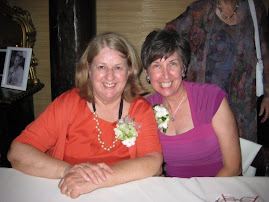 In my last two postings, I expressed frustration over the fact that I haven’t made any demonstrable progress in reaching my dream goal for retirement, i.e., writing a book. For today, I think instead of beating myself up for not making the progress that I would like to have made, I need to take a more positive approach and look at what I have accomplished since June 30, 2008, the date of my retirement. I also need to get real about how I want to live my life. Again, I return to the question: What does it take for me to feel that I am living a fulfilling, meaningful, life?
In my last two postings, I expressed frustration over the fact that I haven’t made any demonstrable progress in reaching my dream goal for retirement, i.e., writing a book. For today, I think instead of beating myself up for not making the progress that I would like to have made, I need to take a more positive approach and look at what I have accomplished since June 30, 2008, the date of my retirement. I also need to get real about how I want to live my life. Again, I return to the question: What does it take for me to feel that I am living a fulfilling, meaningful, life?To review, my initial goals for retirement were to engage in activities that challenged me cognitively, physically and socially. I also included the concept of “engagement” in a cause that is bigger than myself as being necessary to keep me focused and centered. I am very satisfied with my involvement in book study groups that I have joined. They are providing me with both cognitive challenges and social opportunities and I have been thankful for this new opportunity to share and discuss literature. I even served as facilitator at the latest one on John Updike’s Terrorist. The session was a good one and it was clear that my skills as a meeting facilitator, learned and cultivated through many years of leading teacher study groups, combined with my passion for John Updike produced an environment where everyone was comfortable and felt empowered to speak up to share their reactions. I was on a high. I felt I was in my element. What does this tell me about myself?
I have made progress on my exercise / physical fitness goals. In terms that can be measured, I have managed to shed a few pounds and have firmed up important muscle groups. I am able to execute the first basic form of Tai Chi. I continue to remain informed about nutrition and take deliberate steps to buy and consume only those foods which are rich in nutrients (and which my son the nutritionist would approve of.) In addition to my book study groups, I have other outlets for social engagement and volunteerism which keep me involved with friends and provide an emotional support system.
My commitment to reading groups as my primary vehicle for the pursuit of cognitive challenges derives from two underlying desires, the first being to rediscover the pure joy of sitting down with a good book and entering that other world inhabited by people and situations which reveal universal themes that I can relate to. This is where I find so much real pleasure. Time spent in reading is always time well spent. I am continually learning and growing when I read.
The second reason for my determination to be an active participant in my book study groups is to provide myself with an avenue for learning more about what makes good literature. I want to read for pleasure—and then some. I want to read so that I can learn how to write. In that regard, in addition to reading novels, I have researched the writing process and the publishing industry. I love that classic adage written on the classroom walls in 90% of the schools in the division where I worked for 14 years: first learn to read; then read to learn. After all those years of reading to learn how to be a better teacher / how to be a better leader / how to collect and use data to improve instruction, I am now reading to learn how to be a writer. What a treat!
I have always been somewhat impulsive and impatient about things that I really want to accomplish. I am susceptible to severe cases of tunnel vision and am able to block out everything that doesn’t directly relate to my goals. Maybe I need to rethink my attitude about where I’ve been and what I’ve been doing. Haven’t I been working toward my goal of writing a book by reading and discussing what I’ve read? All of the book studies that I have donehave in fact been leading me up to the point where I will be better prepared to take the first critical steps of writing.
As retirees, when we set goals for ourselves, it doesn’t mean that they have to all be accomplished by tomorrow—or by next week—or next month. There is no reason to be as driven as we were when we were working. Instead, what we have identified as goals should serve as a sort of compass, a general direction that we want to follow.
To borrow some sailing metaphors from a dear friend, let’s imagine that we are cruising on our sailboat, and we have plotted a general course which will lead to our ultimate destination. Does that mean that we can’t take an occasional side trip to explore a newly discovered cove or marina? Or that we can’t just stop for a day, drop anchor, and enjoy the air, the sun and the water? Aren’t we supposed to enjoy the actual journey? I learned long ago that success and happiness are not measured by being the first to cross the finish line. Success and happiness are measured by how well we live every day and by enjoying the ride every minute as we steer toward our desired destination. For me, this credo should translate into turning every moment that I may perceive as a “distraction” from my long term goal of writing a book, e.g., activities such as meeting friends for lunch or going to the gym, into moments and incidents which will in the long run enrich my life and also broaden my perspective. This is indeed the gift that retirement offers.




